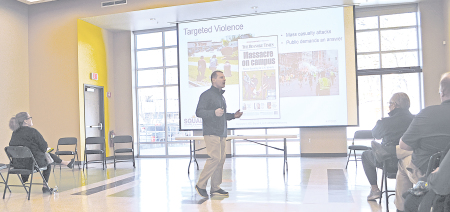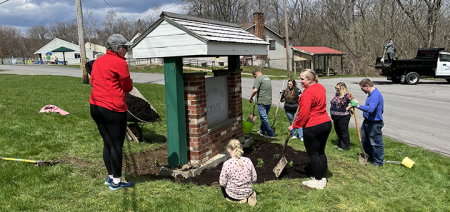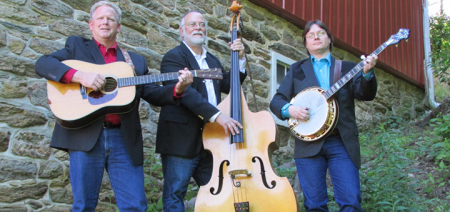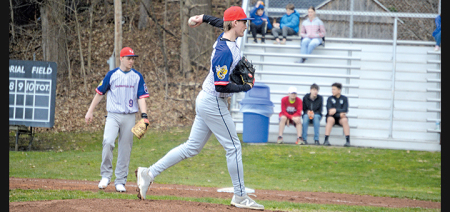Turning Point Offering Free Monthly Alternative To Violence Workshops
Published:
February 28th, 2024
By:
Sarah Genter
 The Turning Point of Chenango County, located at 24 East Main Street in Norwich, is offering free monthly Alternative to Violence workshops, which teach participants teamwork, communication, anger management, and conflict resolution skills. (Photo by Sarah Genter)
The Turning Point of Chenango County, located at 24 East Main Street in Norwich, is offering free monthly Alternative to Violence workshops, which teach participants teamwork, communication, anger management, and conflict resolution skills. (Photo by Sarah Genter)
NORWICH — The Turning Point of Chenango County, an addiction recovery center located at 24 East Main Street in Norwich, has begun offering free monthly Alternative to Violence (AVP) workshops.
Program Specialist Jennifer Lovelace said they're aiming to host the two-day workshops on the last Wednesday and Thursday of each month, with the next workshop scheduled for March 27 and 28 from 9:30 a.m. to 4:30 p.m. Lunch will be provided, and participants will receive a certificate of completion after attending both days of the workshop.
The deadline for registration is March 25, and individuals can register by calling 607-373-3825 or stopping into the center during operating hours.
The workshop aims to teach participants communication, cooperation, teamwork, and anger management skills, as well as resolving conflict without violence.
"Unfortunately, most people involved with addiction have experienced some form of trauma in their life, some violent trauma, and usually it’s physical and emotional. So getting to the root of the anger and the problems," said AVP Facilitator and Trainer Joe Poette. "We do a lot of work on forgiveness. ‘I’ messages, those are exercises like, it’s my problem. So taking ownership of the problem. Those types of things are important when you do introspective stuff and you’re trying to figure out why you’re so angry, and then you learn new skills so you don’t have to be angry."
Poette said the workshops begin with an opening introduction followed by ice breaker activities, and then moves onto their agenda of exercises. However, he said depending on what the group is excited about or needs, the agenda may be adjusted as they go.
He said they have a litany of exercises at their disposal, such as the "Broken Squares" exercise, which teaches the importance of communication and teamwork. Poette said participants are put into groups, and each group member is given a pile of puzzle pieces.
The aim is for each member of the group to use the pieces to create equal-sized squares, but a teammate may have one or more puzzle pieces they need. Group members can share pieces, but they must do so without any communication between each other.
"The only way you can get a piece is if another person gives it to you. There’s no communication," said Poette. "When we debrief the exercise after, we’ll say, how did it feel to not be able to communicate? And also things we observed, like if we see someone that’s got the majority of pieces and they don’t want to pass any or get any from anybody. They’re just trying on their own. So we’ll ask questions about that. How did you feel when you see they had the piece you needed but you couldn’t get it?"
Other exercises include role playing, positive affirmations, and a perspective exercise, where participants list things they perceive and don't perceive as violence.
"A lot of things that people said they thought were violence, other people said they thought they weren’t violent things. It just depends on how you look at it and how you associate it," said Lovelace.
Poette also does "Unanswered Questions" throughout the workshop, where he tracks participants' questions to make sure they're answered during the class.
"If they ask a question and I know that it’s going to be addressed in the workshop and the exercises, we’ll put it up on the wall and it’ll be unanswered questions, and at the end of the workshop if they think their question wasn’t answered then they could ask the question," he explained.
Poette said the workshop also strives to remove preconceived notions about good and bad or right and wrong, which can help with conflict resolution and de-escalation.
"In an argument, it escalates to violence because somebody has to be right and somebody has to be wrong. We try and teach and try to show people there doesn’t have to be a right and wrong. We can have a win-win," Poette said. "As long as you’re respecting the other person, you don't have to agree with them, but if you can respect them we can come up with a conflict resolution that’s not going to be violent."
"When we get into the workshop and we get into deeper exercises, we try to clarify the difference between facts and feelings," he continued. "Instead of saying 'you don’t listen to me,' [say] 'I feel like I’m not heard.' So now I’m taking ownership of the problem, and you’re much more likely to hear that than an accusation. Because if I say you never listen to me, now we’re going to start going back and forth."
"One of the things I like to ask people is, do you want to be right, or do you want to be at peace? Is it really that important to be right? And again, especially in relationships and people you care about, is it that important?"
Although the Alternative to Violence workshops can be beneficial to individuals who struggle with processing anger or those in a domestic violence situation, Lovelace said the classes are open to and can be of benefit to everyone.
"Even people that don’t have domestic violence or anger issues or anything like that, it's still very beneficial for them as well. Because if they were ever, say, out and about and they saw something starting to happen, they can also gain from this program tools to de-escalate the situation," she said. "I know a lot of people, because we're a recovery center, think that the things that we do are only for addicts or people in recovery, and that’s not the case. A lot of the things that we do is open to the community."
The Alternative to Violence Program began in 2008 in response to violence in prisons, and is now a nationwide organization with over 1,600 workshops held annually in more than 80 countries.
For more information on the Alternative to Violence Program, visit avp.international.
For more information on the Turning Point of Chenango County, visit The Turning Point of Chenango County, FORDO Facebook page.
Author: Sarah Genter - More From This Author
Comments








